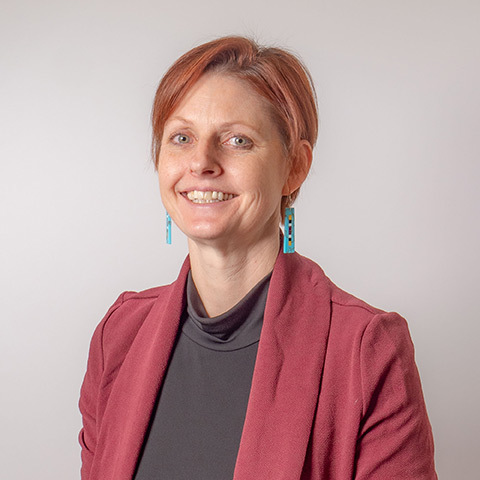Regis College dean blends research and dialogue in newest edition of foundational textbook
Every day, Regis’ faculty and staff innovate and inspire dialogue within their disciplines by engaging students in the academic conversations at the forefront of higher education. Not only teaching, but crafting, contemporary discourse.
Published this May of 2025, Erin Winterrowd, Ph.D., Regis College’s academic dean and women’s gender studies scholar, and Krystle M. Balhan, Ph.D., from Seattle Central College were invited to co-author the seventh edition of “Psychology of Gender/Sex” alongside the founding author, Vicki Helgeson, Ph.D., professor of psychology from Carnegie Mellon University.
Originally written alone by Helgeson, the textbook has historically been a foundational text for psychology, women’s and gender studies education. Opening the door to other authors for the newest edition, Winterrowd described the honor she felt being brought into this larger conversation.
“I'm just so amazed at Vicki’s vulnerability, from her point of view,” said Winterrowd. “She had to have an intellectual conversation about this content with two people who were different from her in many ways. I'm going to inherently bring Regis students with me in my head.”
While working with her students, it became clear that the constantly shifting discourse surrounding sex, gender, feminism and psychology were integral to Winterrowd’s additions to the textbook. Not only to reflect the needs of current students, but students of the future.
The invitation to co-author spurred Winterrowd’s considerations on the discourses. As a feminist theorist, she recognized the valuable work achieved in breaking down gender binaries, but as a scientist, Winterrowd recognized the developments surrounding the binaries of biological sex.
“Women's studies theorists and researchers helped us see that gender is a social construction; the idea of gender has really changed over time,” said Winterrowd. “Sex is also in some ways socially constructed. This part is harder for people to understand, but sex is a continuum. Just like gender is a continuum.”
This newest edition of the textbook reflects these developments in psychology and women’s/gender studies, Winterrowd explained. Originally titled “Psychology of Gender” in previous editions, the inclusion of the word “sex” in the updated title became a point of controversy.
“Feminists work so hard to help people see that just because you were born with a particular biological characteristic, it doesn't mean that your gender expression has to quote unquote match,” said Winterrowd. “That same complexity works in all directions, and it's hard to disentangle the two.”
Much like the binary of gender, the binary between neurobiology and gender theory has had a degree of separation. In the spring of 2025, Winterrowd used the in-progress textbook to guide one of the courses she taught, inviting her students into the publication process alongside her, empowering them to imagine how to bridge this gap.
“What I said to them is, it's okay to challenge intellectual traditions in a field, but you've got to use theory, and you have to use scientific results,” said Winterrowd. “Let me be clear, some of my students hated the title, but that doesn't mean they weren’t amazing participants in the class.”
In an uncertain time for higher education, science and the humanities, reaffirming the value of research and scholarship remains essential to making difficult subjects accessible through continued inquiry.
Through the publishing process, as Winterrowd described, she gained a newfound recognition of the effort that other researchers and educators put into research publication during precarious social and political conditions.
“It's important to be unafraid,” said Winterrowd. “Real consequences are happening to scientists, and yet... The science must continue.”
